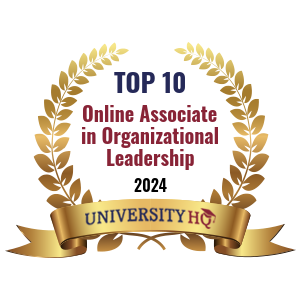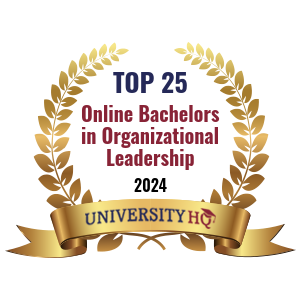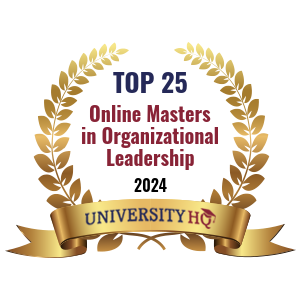What is Organizational Leadership?
Mississippi is a deep-south state that is home to an increasingly diverse and growing economy. While its revenues mostly come from agri-business, as they have for most of the state's history, Mississippi is also welcoming new-economy ventures. Currently, Mississippi is home to the nation's lowest cost of living but is one of the highest producing states for farm-fresh items such as poultry, eggs, dairy, and cotton. Mississippi is also the top producer of pond-raised catfish.
An organizational leader is a business professional who has a vision. They see the big picture for their organization and industry. They are less impressed with quarterly earnings or short-term projects and more interested in where the company will be in five years. Organizational leaders were anticipating the need for artificial intelligence when everyone was agog over mobile apps. They are always a step ahead, helping their company grow and adapt to the future.
Organizational leaders tend to spend their working days sitting at a desk, using a computer. Most commute to an office, but that may be changing in the wake of Covid, which sent many home to work remotely. Many organizational leaders already worked remotely because they were consultants for top companies. Organizational leadership consultants tend to do a lot of traveling to present their clients with their findings. Some consultants spend as many as five days a week traveling.

Featured Online Programs
Online Organizational Leadership Education in Mississippi
Mississippi's industries may not crack the top-ten in the nation, but the state is strongest when it comes to its manufacturing sector. Companies from the automotive and other industries flock to Mississippi for its low cost of doing business. In fact, much of its manufacturing may be involved in food processing, given its relative agricultural strength. Manufacturing brings in $19 billion in annual revenues, raking Mississippi 33rd for the sector, nationwide.
Mississippi's economy is also led by its real estate sector, which brings in $12 billion annually, earning Mississippi the #39 spot in the nation. The third strongest economic super sector in Mississippi is the education, social services, and healthcare industry, which earns its keep with $10 billion in revenue and the 36th spot in the nation.
As Mississippi continues to grow, it increasingly depends on highly skilled, academically trained professionals. The state legislature understands this and helps to support the state's public community colleges, four-year colleges, and universities with ample funds for their business degree programs. The state's management and organizational leadership degree programs can therefore continually produce top talent for the Mississippi economy.
To help the process, Mississippi's colleges and universities seek out the very best academics to teach in their organizational leadership degree programs. It's relatively easy to recruit the nation's best to Mississippi, where academics find that their salaries go very far indeed. Organizational leadership faculty also look for experts from the local economy. They hope to find organizational leaders who have a master’s organizational leadership degree who want to teach undergraduate students.
When instructors have experience within the Mississippi economy, they can bring special insights into the classroom. Plus, students always appreciate when an instructor has practical experience in their state. These future business leaders are thus inspired to lead Mississippi to the next level of excellence.
Online Associates (AS)

Business students are smart to start their academic careers with an associate organizational leadership degree from a Mississippi community college. These two-year degrees introduce students to the fundamentals of management and leadership skills, organizational effectiveness, and more to prepare students for entry-level management positions. They also push students to complete the general education curriculum that any bachelor’s organizational leadership program will require.
An associate organizational leadership program is smart for other reasons, too. One of their chief benefits is their low cost. Mississippi college students see tremendous savings when they choose a community college for their core required courses. Those that go on to complete a bachelor’s organizational leadership degree will notice that their total expense is far less than their friends' who spent all four years in a four-year university. Community colleges are also more convenient in that one can be found in most counties in Mississippi. Thus, students can complete their required courses and get started on organizational leadership before deciding where to complete their degree.
Online Bachelors (BS)

A full, four-year bachelor’s organizational leadership degree is perhaps the best foundation for a successful career. Students should aspire to complete their full undergraduate degree programs in a timely manner. Employers like to recruit candidates with a bachelor’s degree because they tend to have more thorough knowledge of management and organizational leadership. They also have a more well-rounded knowledge base and skillset.
Bachelors organizational leadership degree students can augment their major degree studies with complementary courses and even minor concentrations. You can check the program details from your chosen school, but many institutions include subjects like organizational behavior, organizational development, the global economy, how to communicate in an organizational setting, etc. To complement this field, they might consider studying economics, sociology, data science, or management as a minor. Furthermore, bachelor’s organizational leadership degree programs tend to support students with internship opportunities. Students who find mentors and other real-world role models will graduate with a more wholistic view of business and organizational leadership and have excellent career opportunities.
Find Your Online Organizational Leadership Program
Online Masters (MS)

To truly succeed as an organizational leader, it's vital to complete a master’s organizational leadership degree program. Undergraduate students should start thinking about which graduate degree program is best for them as soon as their third year of an undergraduate program. They should look for either a MS in organizational leadership degree program or an MBA degree program that features an organizational leadership or business administration concentration. A Master of Science in organizational leadership program will provide working professionals with in-depth knowledge of organizational development, organizational design, how to increase productivity and effectiveness, and how to be transformational leaders.
Yet another option is a dual MBA degree program. These intensive programs will likely require that students not work while they study because they pack two master’s degrees into a three-year period. This allows students the opportunity to design a dual master’s degree program that best suits them. For instance, some may choose a JD/MBA program that features organizational leadership for their MBA concentration area. Others might complete a master’s organizational leadership degree alongside an MBA that includes a concentration in finance. The combinations are nearly limitless.
Online Doctorate (PhD)
Most business recruiters don't seek out PhD students for their positions, but that may be different when it comes to organizational leadership. Those with a PhD focused on organizational leadership have a deeper and broader knowledge of the field than others. Given that such a broadminded approach is a big part of what organizational leadership is all about, recruiters may take note of a PhD in the field.
Organizational leaders with a PhD may also decide to work as outside consultants. Firms like to hire consultants who have top credentials, and a doctorate certainly qualifies. Naturally, those with a PhD in organizational leadership may also decide to enter an academic career. University faculty members can fall into two camps: teaching faculty or research faculty. Research faculty can earn tenure while they continue to conduct research. They don't even necessarily need to teach or lecture, but they do need to continually find grants or other revenue streams to fuel their research endeavors.
Become an Organizational Leadership Professional in Mississippi
Organizational leadership is something of a new concept in the world of business. It's an exciting career path for aspiring business leaders, a position that may seem like a far-off dream. However, it’s possible to become an organizational leader in Mississippi when following the proper steps.
One of the chief characteristics of an organizational leader is their ability to see the bigger picture. They are not narrow-minded specialists who only understand their particular corner of their field. Rather, they have a broad base of knowledge and a vision that can see it all at once. This is a quality or skill that must be cultivated over the course of a lifetime. Naturally, the best organizational leaders will start their path early in life.
Future organizational leaders learn to love learning. They read across a broad range of subjects, sharpen their critical thinking skills, and seek to understand even those things that may be completely foreign to them. Becoming a lifelong learner is imperative and requires habits that can start at any age. This will involve a lot of extra reading, especially for students still in high school. It will naturally involve a strong academic background.
While there is no silver bullet for becoming an organizational leader, certain steps may be very helpful. First off, students should strive to attend the best, most rigorously intellectual college they can. Then, they need to think carefully about their choice of college major.
Find Online Organizational Leadership Programs
Many will gravitate to a business subject such as management, but there are other options. One strong contender is a finance or economics degree. However, there's a dark horse hiding in the academic wilds that may be of great help to an organizational leader. That is philosophy. When paired with economics, philosophy is a powerful degree to have. It is inherently interdisciplinary and it's also worth noting that many prominent, famous philosophers were centered at the London School of Economics.
Students who study philosophy and economics will also want to focus on completing internships during their summer breaks. Practical experience will bolster their studies and boost their resumes upon graduation. Students should also have a clear plan for attending graduate school. While some will dive into an MBA program upon completing their undergraduate degrees, it may be wise to take two years to work in the business world prior to diving into an MBA. This way, it will be easier to know where to focus one's studies.
Potential Careers for Leadership Graduates
- General Manager and Operations Manager
This position is one that asks the manager to oversee many departments. General managers often earn their position after working in multiple areas in their company. They must have a strong working knowledge of all the jobs that make the company run, on top of a strong base of academic knowledge. Many general managers hold an MBA. - Business Management Analyst
These management experts may work for a large corporation or a consulting firm. Management analysts conduct an audit of a sort on the management professionals they are tasked with analyzing. Their goal is to determine the efficacy and efficiency of any given management team. Management analysts should hold at least a bachelor’s management degree, but most will need an MBA. - Compensation Benefits and Job Analysis Manager
These human resources professionals focus on the value of workers. They help to put together compensation packages that motivate new recruits to take a job and packages that keep current employees happy. They also make sure that a company can reap more return for their compensation. - Training and Development Manager
To keep a company fresh and growing, it's necessary to continually train employees. Training and development managers keep their eyes out for new opportunities to help their teammates learn new skills. This position is often under the auspices of the human resources department. - Non-Profit Executive Director
This position is often the top of a non-profit organization. Executive directors oversee entire organizations, from fundraising to daily operations. They often rise through the ranks and have experience working in all aspects of their organization. Often, a non-profit executive director needs to have an MBA with a concentration on non-profit management. - Healthcare Administrator
This position is analogous to a manager in a non-healthcare organization. Healthcare administrators oversee the operations in hospitals, clinics, and small medical practices. While a standard business degree may help land a position as a healthcare administrator, a focused degree in healthcare administration may be preferred. - Technology and IT Director
After a number of years working in information technology, it may be possible to become an IT director. IT directors not only have experience, but they may also have special certifications and degrees in information technology. To move past this position, consider an MBA with a concentration in information technology. - Chief Information Officer
This position is the top of the information technology ladder. CIOs often have many years of experience in IT and a master’s degree. It may be advisable to earn an MBA with a concentration in information technology, though another option may be a dual MBA that combines a MS in IT with an MBA. - Supply Chain Manager/Logistician
This job is a huge part of what makes our economy operate. During the Covid crisis, we saw how supply chain problems resulted in empty shelves and problems for many people. Logisticians keep goods and services moving throughout the economy and world. They monitor multiple factors that may impede shipments and they adjust accordingly.
Search All Programs
